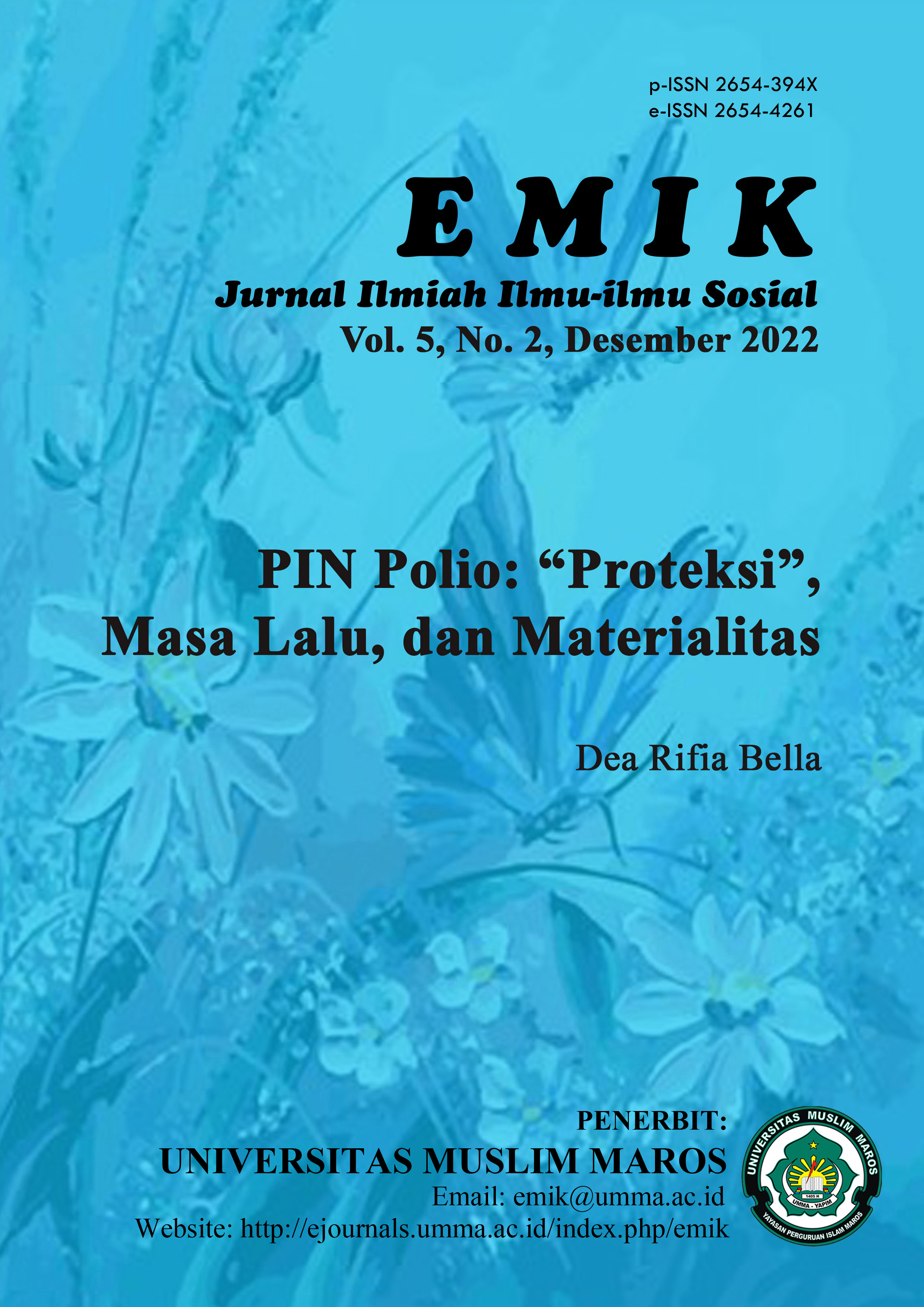PIN Polio: “Proteksi”, Masa Lalu, dan Materialitas
DOI:
https://doi.org/10.46918/emik.v5i2.1533Keywords:
Cirebon, Polio, Immunizatio, Rejection, Storie, MaterialityAbstract
In 1996, there was a national scale immunization program called Polio National Immunization Week (PIN Polio) by the Indonesian Ministry of Health. The people at Benda Kerep Village, Cirebon became one of the targets of the health development program, but the program was failed in this area. This article focuses on the process of producing meaning by actors involved in the issues associated with PIN Polio program, so that controversy regarding this program is inevitable.
This qualitative research was conducted in 2016 and additional occasional visits until 2022. There were eight informants involved in this study, consisting of two influential clerics (kyai), a mother who accepted the implementation of the PIN Polio program, and two others who don’t, and three health workers from the Health Office Cirebon. Data was collected using in-depth interview and observation techniques to understand why Polio PIN program in 2016 was failed in Benda Kerep Village, so that the level of community participation was very low in Benda.
The results show that the stories behind the failure of implementation PIN Polio in 1996 at Benda Kerep has become the background of the failure of the program with various events that are considered as the impact of Polio injection. This is because stories of these past traumatic events are still circulating amongst the Benda Kerep people – even though they have not experienced it directly. It is argued in this article that language practice do not stand alone, it is closely associated with the existence of material health, such as syringes, uniforms and crowds of people who reinforce the meaning of past events.
References
Emmerson, R. M.; Fretz, R. I.; dan Shaw, L. L. 1995. Writing Ethnographic Fieldnotes. Chicago, Illinoi: The University of Chicago Press.
Ferguson, J. 1999 Expectations of Modernity: Myths and Meanings of Urban Life on the Zambian. Berkeley: University of California Press.
Foucault, M. 1980. Power/Knowledge: Selected Interviews and Other Writings, 1972-79. New York: Pantheon.
Foucault, M. 1976. The Birth of the Clinic: An Archaeology of Medical Perception. England: Tavistock Publications.
Foucault, M. 1961. Madness and Civilization. France: Librairie Plon.
Ingold, T. 2017. “On Human Correspondence”, Journal of the Royal Anthropological Institute, 23(1):9–27, https://doi.org/10.1111/1467-9655.12541, diakses tanggal 15 Oktober 2022.
Jourdan, C. dan Tuite, K. 2006. Language, Culture, and Society. Cambridge: Cambridge University Press Book.
Keane, W. 1997. Signs of Recognition Powers and Hazards of Representation in an Indonesian Society. Berkeley: University of California Press.
Kohn, E. 2015. “Anthropology of Ontologies”, Annual Review of Anthropology, 44 (1): 311-327, https://www.annualreviews.org/doi/abs/10.1146/annurev-anthro-102214-014127, diakses tanggal 17 Oktober 2022.
Latour, B. 2005. Reassembling the Social: An Introduction to Actor-Network-Theory. Oxford: Oxford University Press.
Latour, B. 1993. We Have Never Been Modern. Cambridge, Massachusetts: Harvard University Press.
Li, T. M. 2000. “Articulating Indigenous Identity in Indonesia: Resource Politics and the Tribal Slot”. Comparative Studies in Society and History, 42(1):149-179, https://doi.org/10.1017/S0010417500002632, diakses tanggal 17 Oktober 2022.
Mol, A. 1999. “Ontological Politics: A Word and Some Questions”, the Sociological Review, 47(1):74–89, https://journals.sagepub.com/doi/10.1111/j.1467-954X.1999.tb03483.x, diakses tanggal 22 Oktober 2022.
Peacock, J. 1991. “Form and Meaning in Recent Indonesian History: Some Reflections in Light of H.-G. Gadamer's Philosophy of History”, dalam Ohnuki-Tierney, E. (ed.), Culture Trough Times: Anthropological Approaches. California: Stanford University Press, 246-267.
Pierce, C. S. 1955. Logic as Semiotic: The Theory of Signs. London: Routledge.
Rapport, N. dan Overing, J. 2000. Social and Cultural Anthropology: the Key Concepts. London and New York: Routledge.
Rudnyckyj, D. 2011. Spiritual Economies: Islam, Globalization, and the Afterlife of Development. New York: Cornell University Press.










9.png)















